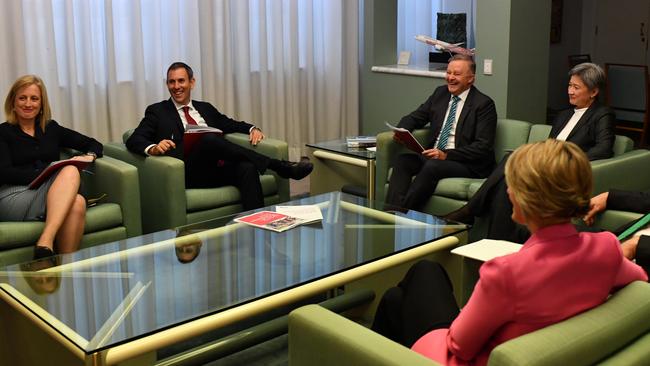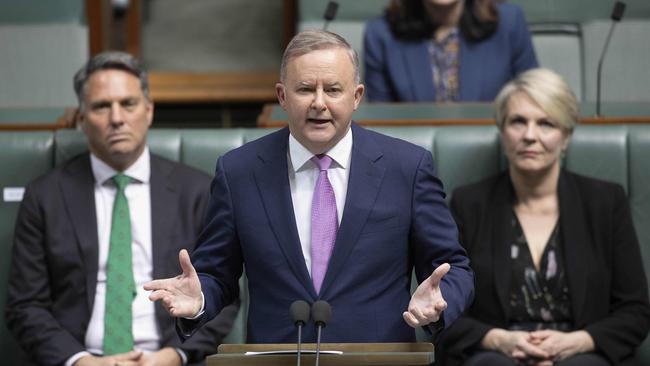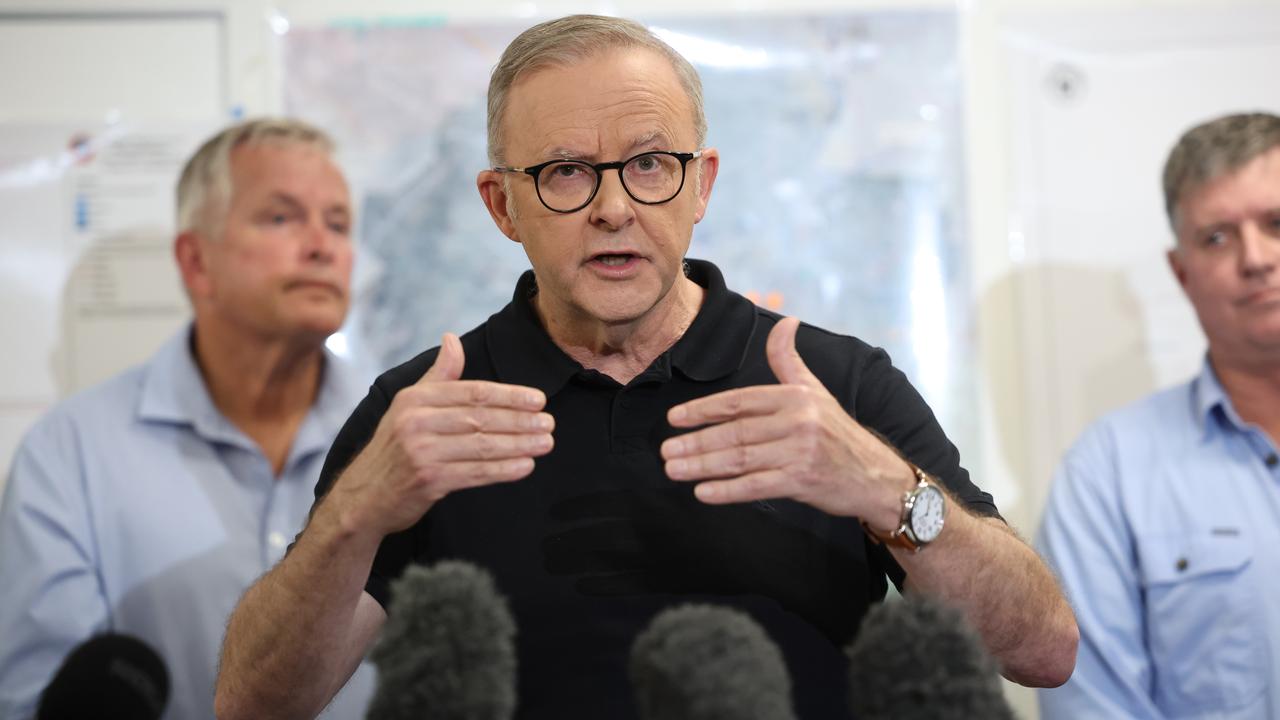Listless Labor in danger of becoming a zombie party
Anthony Albanese is uninspiring and his party is stuck in its B-grade recent past. The truth is his leadership is circling the drain.

This complacency has many on Labor’s front and backbench, and more in the party ranks and union movement, worried. Albanese, most think, has no cut-through. The voters are not listening to him. Labor MPs are frustrated that they rarely land a glove on the Coalition. The polls are diabolical. The mood within the party is grim.
Labor is in danger of becoming a zombie party — aimless with little sign of life. The B-grade frontbench from the Rudd-Gillard years is just going through the motions. Many blame the pandemic when there is a “rally around the flag” effect for most governments. Yet Labor has done little since the last election to revitalise its policies. Its political strategy is defective. And the party organisation remains largely moribund.
With a pervasive sense of drift, and the party unsettled, Albanese’s budget reply took on new importance this week. The big-ticket childcare policy, which would see more women return to the workplace and relieve pressure on families, is well crafted and timed. It is similar to Labor’s childcare policy at the last election, like other announcements on skills, manufacturing and energy. Yet Labor MPs were encouraged that Albanese, after 17 months as Opposition Leader, is finally committing to a landmark policy. But the speech underlined the difficulty that remains: it was a flat delivery that did little to inspire. The House looked like it had taken a collective dose of Mogadon.
In unguarded moments, many on Labor’s frontbench concede the prospect of winning the next election is very unlikely. Some have almost given up entirely. Sure, they’ll front the media to respond to the issues of the day and prepare election policies but, again, this is just going through the motions.

Labor has never won an election without a popular leader who can excite the party with the promise of their charisma coupled with bold policy ideas. The central problem for Labor — in addition to its declining electoral base — is Albanese. “He wanted the leadership so badly but he doesn’t know what to do with it,” is a common refrain from shadow ministers.
The party’s true believers — those who turn up to mind-numbingly boring local branch meetings and hand out how-to-vote cards — have become impatient. Labor MPs report frustration, even anger, with Albanese’s largely listless performance. They see the Morrison government with huge failings that Albanese is unable to prosecute. When he does go on the attack, it usually misfires. When facing tough questions, he gets cranky with interviewers.
Labor is trapped between being totally negative, opposing everything the Coalition does in response to COVID-19, or being co-operative and supportive. Albanese struggles to deliver a consistent message. On the one hand he has criticised the national cabinet and the public health and economic response to the pandemic. But on the other hand, he wants credit for being bipartisan.
The Morrison government has won broad support for its pandemic response. Albanese cannot bring himself to say this. But the Andrews government in Victoria has seen a sharp fall in support for obvious reasons: the hotel quarantine blunder, the flawed tracking and tracing program, and excessive lockdowns. But Labor is silent on the disastrous performance of the Andrews government.
The latest example of Labor’s awful messaging is its phrase, “the Morrison recession”. This is cringeworthy in the extreme. It shows Labor to be wholly reactive. It is absurd overreach. How could anybody blame the Morrison government for a recession induced by a global pandemic. It is intellectually dishonest and politically stupid.
The pandemic has caused a fundamental change in how we live, work, educate, socialise, exercise and entertain. The opportunity for innovative and creative policy ideas is paramount. So where is the leadership that sees this as a great opportunity to reboot the party’s policies in response to a once-in-a-century event? It has not come from Albanese. His “Vision Statements” — he capitalises the “V” and the “S” — have sunk without trace.
But some Labor MPs have been busy putting pen to paper outside the shadow cabinet. There are several new collections of essays that seek to chart a way forward for the party. The best of these books is Tanya Plibersek’s edited collection, Upturn: A Better Normal After COVID-19 (NewSouth), which is published next month. It provides an upbeat, forward-looking, positive collection of ideas for a post-pandemic Australia.
Labor needed to spend the time since the last election engaging in a bout of soul-searching. The party’s draft platform — revealed by my colleague Greg Brown — is a pale imitation of the once great Labor Party bursting with ideas, with an enlarging vision for Australia, bold, passionate and determined.
Why did Labor cancel its national conference? The US Democrats held their convention this year. The British Labour Party held its annual conference. There is no reason why the party could not have held a virtual conference to debate policy. It would have also been an opportunity to address the systemic weaknesses within the party organisation and refresh its principles for the modern era.
Albanese had plenty of boosters in the media who promised he would appeal to voters in Queensland and Western Australia — wastelands for federal Labor. Well, the published polling and the party’s private research show no improvement in federal Labor’s standing in those states. Its primary vote, nationally, is flatlining in the dismal mid-to-low 30s. Scott Morrison has a commanding lead as preferred prime minister. Labor has not won back voters lost to the Greens on the left or the Coalition and One Nation on the right.
The overarching problem within Labor remains how to reconcile its working-class moderate base with its postmodern middle- and upper-class progressive instincts. Labor is in danger — led by an inner-city left faction leader who has spent his life in politics — surrendering to the green-left wing of the party. The split on energy policy between Mark Butler and Joel Fitzgibbon is emblematic of this divide.
The central myth about politics during the pandemic is that governments around the world benefit from being in power during a crisis. There is nothing automatic about winning support; it must be earned. This is what Labor fails to understand about Morrison. Donald Trump and Boris Johnson have lost voter support because their pandemic response has been defective.
This testifies to another reality that Labor must confront. Democratic presidential nominee Joe Biden and UK Labour leader Keir Starmer have surged in the polls. Why? Because they have effectively critiqued Trump and Johnson, offered measured and realistic alternative responses to the pandemic and the recession, and have credibility with voters. This exposes the claim that it is too tough for Albanese. The truth is that his leadership is circling the drain.




The next election has already been run and won. Anthony Albanese said so in a podcast interview in August. “I know that we will win the next election,” he said. Labor does not need to show it has learned the lessons of its last defeat. It does not need to keep the government to account. It does not need to earn votes with a new agenda. The voters have decided and Albanese has claimed victory.